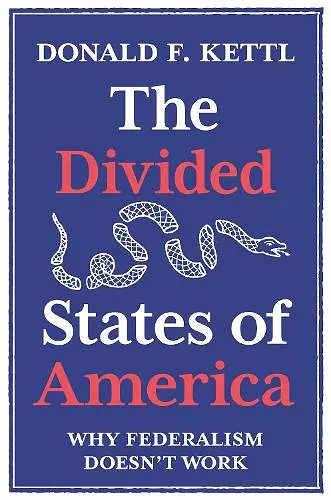The Divided States of America
Why Federalism Doesn't Work
Format:Paperback
Publisher:Princeton University Press
Published:5th Apr '22
Should be back in stock very soon
This paperback is available in another edition too:
- Hardback£22.00(9780691182278)

Why federalism is pulling America apart—and how the system can be reformed
Federalism was James Madison's great invention. An innovative system of power sharing that balanced national and state interests, federalism was the pragmatic compromise that brought the colonies together to form the United States. Yet, even beyond the question of slavery, inequality was built into the system because federalism by its very nature meant that many aspects of an American's life depended on where they lived. Over time, these inequalities have created vast divisions between the states and made federalism fundamentally unstable. In The Divided States of America, Donald Kettl chronicles the history of a political system that once united the nation—and now threatens to break it apart.
Exploring the full sweep of federalism from the founding to today, Kettl focuses on pivotal moments when power has shifted between state and national governments—from the violent rebalancing of the Civil War, when the nation almost split in two, to the era of civil rights a century later, when there was apparent agreement that inequality was a threat to liberty and the federal government should set policies for states to enact. Despite this consensus, inequality between states has only deepened since that moment. From health care and infrastructure to education and the environment, the quality of public services is ever more uneven. Having revealed the shortcomings of Madison's marvel, Kettl points to possible solutions in the writings of another founder: Alexander Hamilton.
Making an urgent case for reforming federalism, The Divided States of America shows why we must—and how we can—address the crisis of American inequality.
"
A clear and cogent exposition.
"---Colin Woodard, Washington Post"The situation, Mr. Kettl concludes, ‘is serious, perhaps even bleak.’ He chooses to believe that it ‘need not be fatal to the nation’s grand democratic vision.’ In these perilous times, made worse by a pandemic, one can only hope he is right."---Glenn C. Altschuler, Pittsburgh Post-Gazette
"
The book sets the stage for a more informed inquiry into the quintessential public administration problem – can we use historical knowledge to design better institutions and incentives to address socioeconomic inequalities of the future.
"---Meril Antony, Journal of Public Affairs EducationISBN: 9780691234175
Dimensions: unknown
Weight: unknown
248 pages